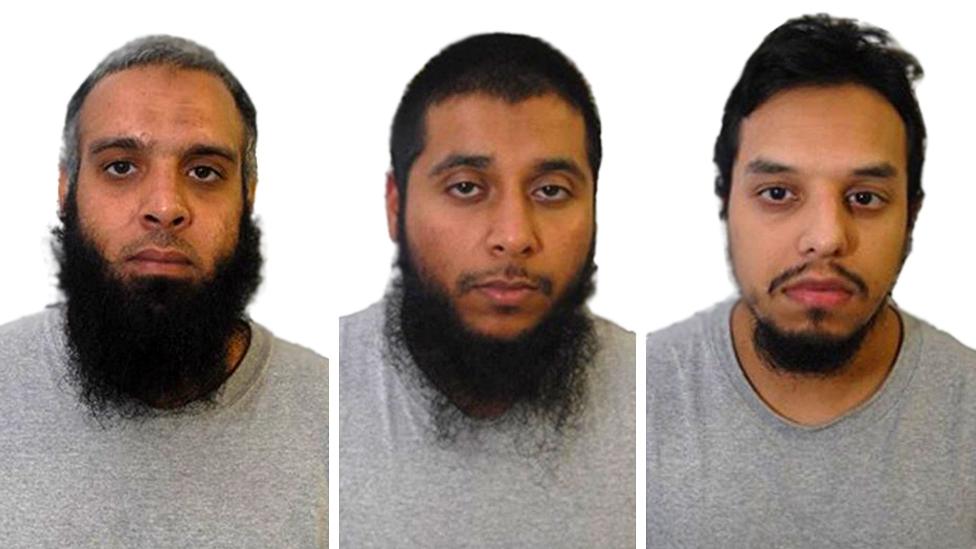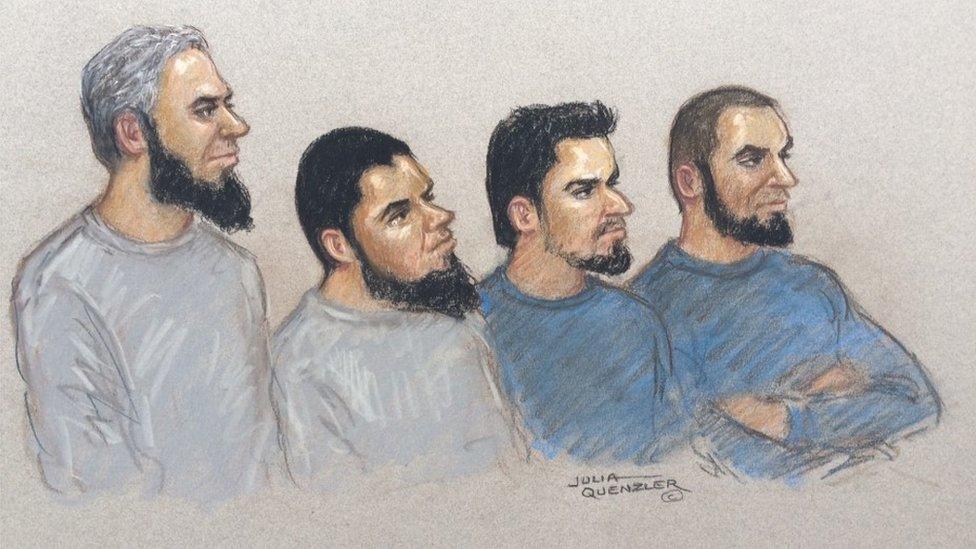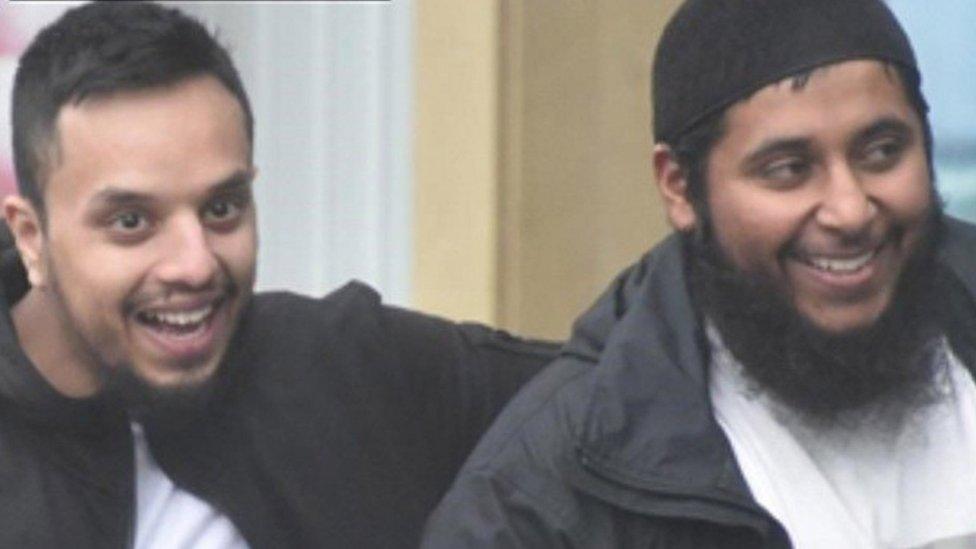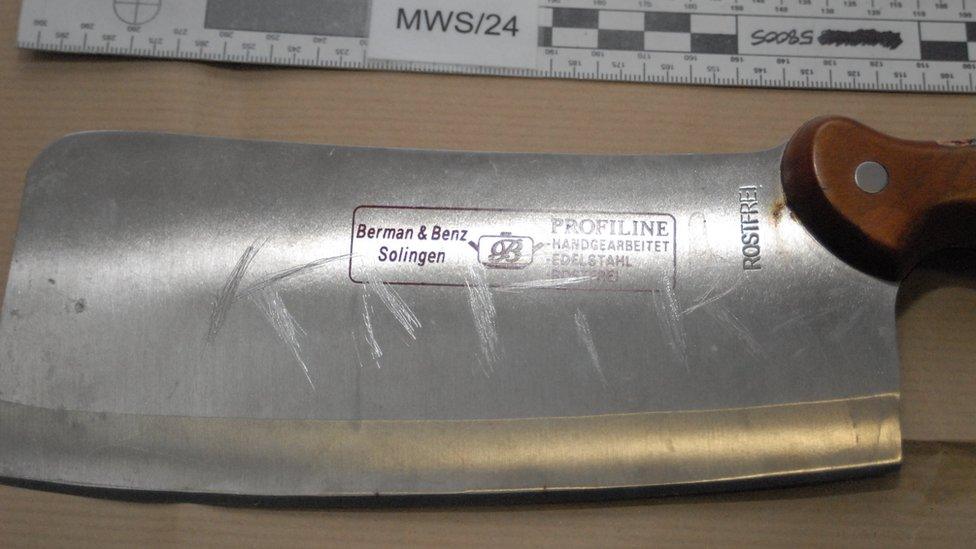'Three Musketeers' guilty of planning UK terror plot
- Published

Naweed Ali, Khobaib Hussain and Mohibur Rahman were convicted at the Old Bailey
Three men who dubbed themselves the Three Musketeers have been found guilty of plotting a terror attack on a police or military target in the UK.
Naweed Ali, 29, and Khobaib Hussain, 25, both of Sparkhill, Birmingham, and Mohibur Rahman, 33, of Stoke-on-Trent, were convicted at the Old Bailey.
They were arrested last August in an undercover police sting.
A fourth man, Tahir Aziz, 38, from Stoke-on-Trent, was found guilty of the same offence.
They will be sentenced on Thursday.
Police say the men, who had all denied preparing terrorist acts, were inspired by so-called Islamic State, also known as Daesh.
They were described as "dangerous men" who were committed to carrying out a "mass casualty attack".
Officers said the case was "one of the most complex counter terrorism investigations in a number of years".
The court heard how the members of the gang called themselves the Three Musketeers when exchanging encrypted messages on the Telegram app.

Naweed Ali, Khobaib Hussain, Mohibur Rahman and Tahir Aziz had denied preparing terrorist acts
Evidence found on the men's phones and other devices showed they had shared "radical and extremist beliefs" in messages.
They were caught after counter-terrorism officers set up a fake courier firm, called Hero Couriers, where Hussain and Ali were offered driving shifts.
Ali arrived for his first shift at the fake firm in August last year, leaving his Seat Leon car at the Birmingham depot, where MI5 officers searched the vehicle with a view to bugging it.
However, inside they found a JD Sports bag containing a partially-constructed pipe bomb and meat cleaver with the word "kafir" - meaning non-believer - scratched on it.
An imitation gun, cartridges, a 9mm bullet, latex gloves and industrial tape were also recovered.
The trial was told when police searched Aziz's car they found a samurai-style sword next to the driver's seat.
All four men were arrested on 26 August.
The men claimed the incriminating evidence was planted by an undercover officer, known as "Vincent", who posed as the boss of the fake courier firm.
The officer, who gave evidence anonymously, was cross-examined for 12 days and repeatedly rejected the allegations.

Mohibur Rahman (left) and Khobaib Hussain were photographed as part of the operation
The jury heard how the defendants had been looking at violent material online, joined extremist social media groups and bought new mobile phones to help them further their plans.
Neighbours Ali and Hussain have previously been jailed for terrorism offences.
They had attempted to join an al-Qaeda training camp in Pakistan in 2011. However, when they arrived back in the UK they were arrested and the following year both pleaded guilty to engaging in conduct in preparation of terrorist acts.
The trial heard the pair first met Rahman - who had been convicted of possessing an al-Qaeda magazine - while in prison.
'Violent material'
Responding to the verdicts, Chief Superintendent Matt Ward, head of the West Midlands Counter Terrorism Unit, said: "Back in 2010 and 2011, they were inspired by al Qaeda.
"Since they've come out of prison, they've been inspired by the Daesh ideology.
"They shared lots of material regarding that ideology, lots of very violent material, they were trying to encourage others to join them on that journey."
He said the men had "carefully planned and took steps to avoid drawing attention to themselves", including leaving their mobile phones at home when they travelled to meet in Stoke.

Police found a meat cleaver with the word Kafir scratched on it
Mr Ward also defended his officers, including one who was accused in court of planting evidence.
"Throughout the trial the defence made a number of accusations," Mr Ward said.
"Many of those accusations were groundless, they went against the integrity of the undercover operatives, they went against the integrity of the wider investigation.
"What I would say is just because a defence lawyer says something in court, doesn't make it true."
The four-month trial was held partly in secret in the interests of national security and two anonymous witnesses gave evidence behind closed doors.
Sue Hemming, from the CPS, said the men "shared the same radical belief in violent jihad".
"Recent attacks have demonstrated the kind of horror these defendants could have caused had they not been stopped," she added.
- Published2 August 2017